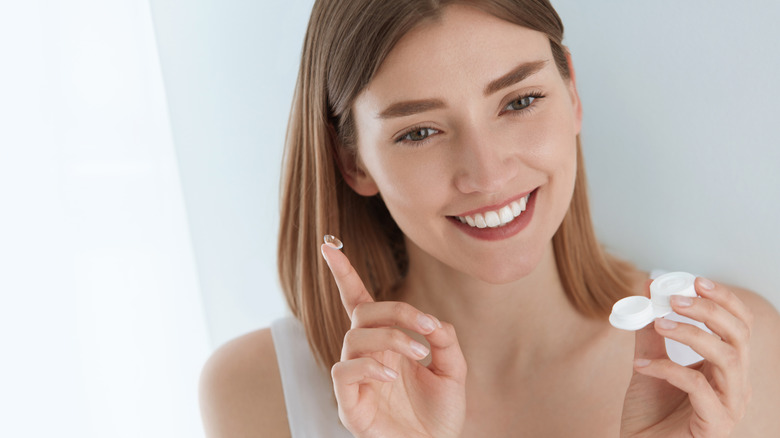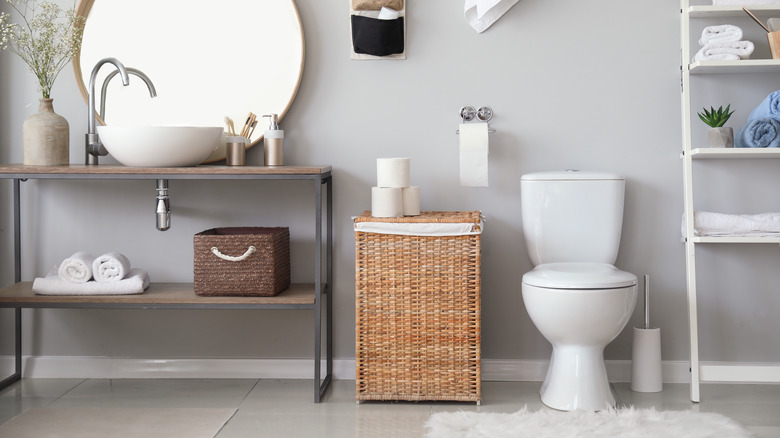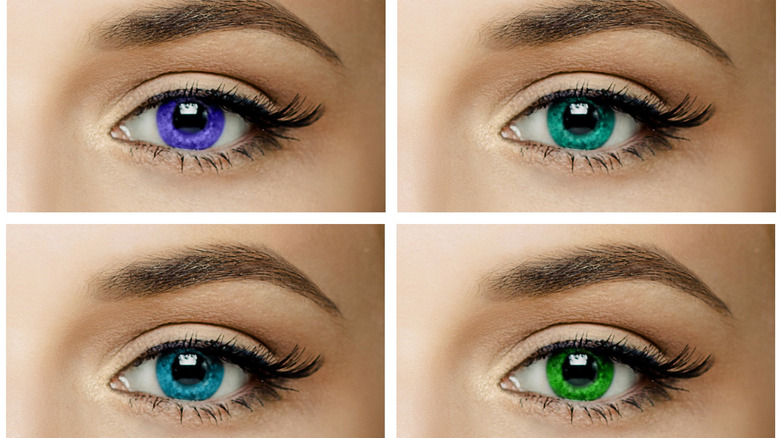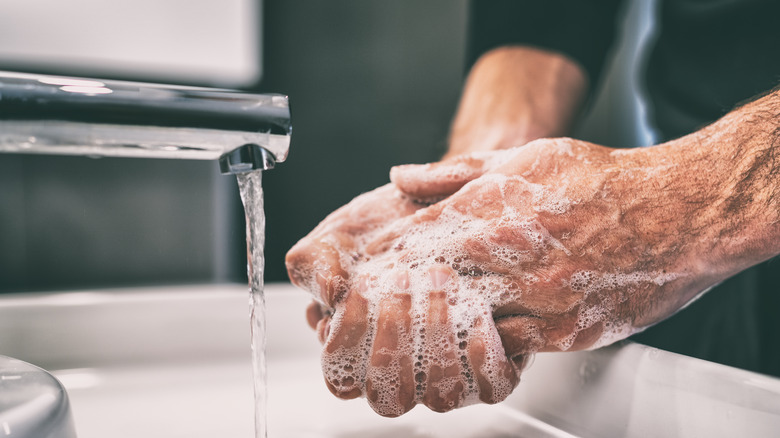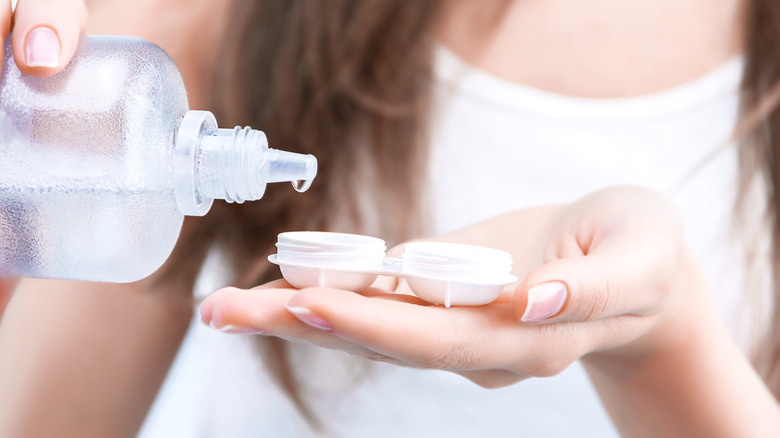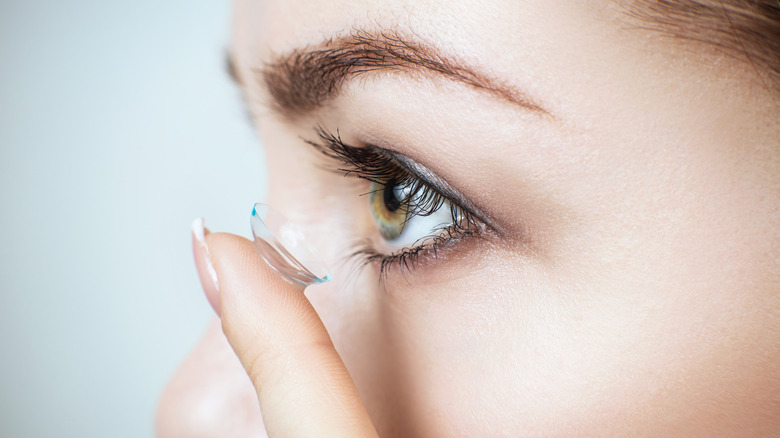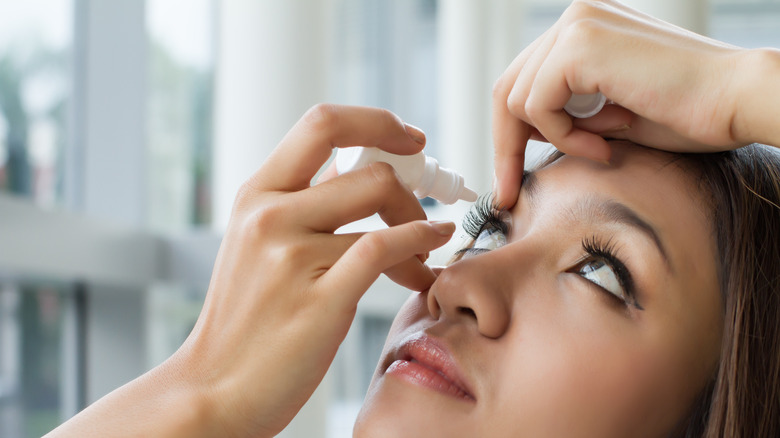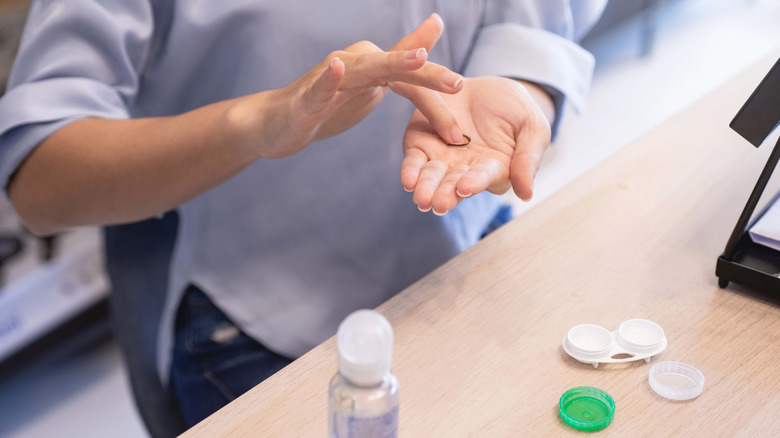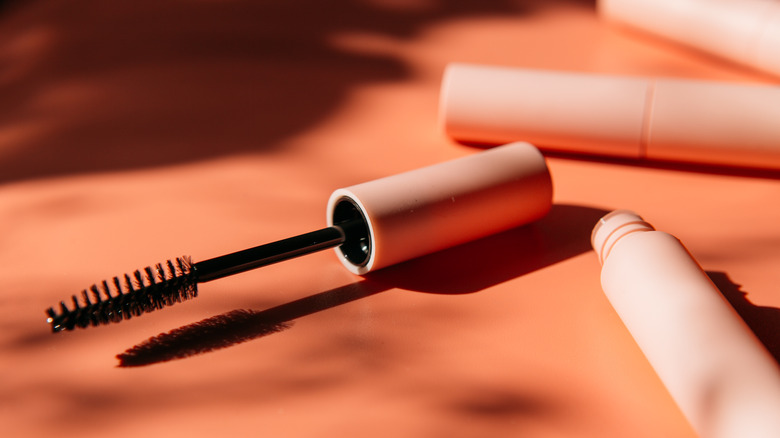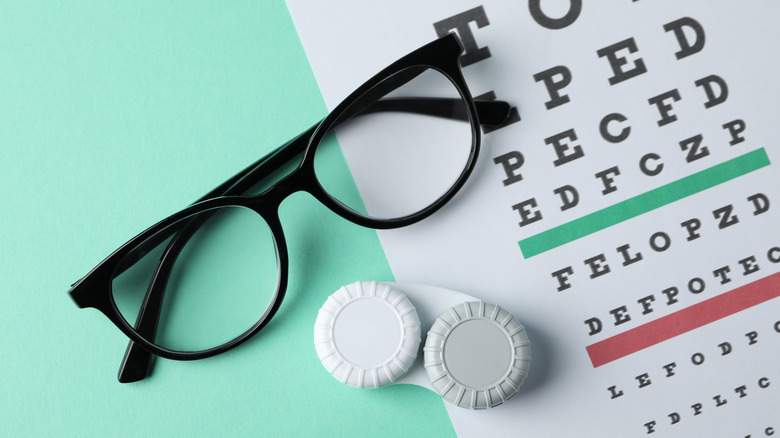The Biggest Mistakes You're Making With Your Contact Lenses
How many people do you think wear contact lenses in the United States? Ten million? Twenty million? Actually, there are around 45 million contact wearers in the U.S. alone. However, 40% to 90% of people who wear contacts don't take care of them correctly, according to the Centers for Disease Control and Prevention (CDC). This includes not only properly using the lens solution recommended by a health care professional, but also other basic dos and don'ts when it comes to contact lenses.
Admittedly, this might not sound like a terrible thing. After all, sometimes you have to cut corners when it comes to your daily routines. But make no mistake, not properly caring for your contacts could put your vision at risk. Each year as many as one out of every 500 people who wear contacts develop infections in their eyes that have the potential to leave them blind, notes the CDC.
So, does that mean proper contact lens maintenance will guarantee you will never get an eye infection? Obviously, that's a promise no one can make since many factors impact whether or not you develop an infection anywhere in your body. However, avoiding certain common mistakes will greatly reduce the chances of experiencing eye issues related to your contacts — and in the process help safeguard your vision.
Wearing contact lenses when you're sick
You wake up and immediately feel under the weather. Hoping you're just a little groggy, you put in your contact lenses and try to have a normal day. Unfortunately, you only feel worse in the days that follow, but you try to fight through it by forcing yourself to get out of bed, get dressed, and put in your contact lenses. Has this ever happened to you?
First, while it's understandable to push through sickness, your body often needs rest to recover. But second, reapplying contact lenses while you're ill can actually make your situation worse. "In the presence of an infection, the continued handling and use of contact lenses may spread infection to the eye, and in the presence of contact lenses, the infection poses greater risk to the health of the eye," Dr. Howard R. Krauss, a surgical neuro-ophthalmologist, told AccuWeather. In fact, the virus that often causes conjunctivitis (pink eye) is the same viral invader responsible for the flu and the common cold (via Diamond Vision).
Even if you don't feel physically ill, Dr. Krauss cautions that your tears and the natural mucus in your eyes can still be infected with viruses. So, if you even suspect you're coming down with something, avoid wearing your contact lenses. And if you develop pink eye while your contact lenses are in your eyes, then throw out those lenses and their storage case to avoid reinfection (via Diamond Vision).
Storing contacts in the bathroom
If you've made this next mistake when it comes to your contacts, you're not the only one. After all, keeping your contact lenses in their storage case right by your bathroom sink seems like a smart idea — especially since it's important to wash your hands before handling contact lenses. However, keeping your contacts in the bathroom increases the chances of contamination.
As Sunshine Optometry explains on their website, bathrooms are usually humid. And when the humidity goes up, the possibility that microbes will start growing on your contact lenses goes up with it. In addition, the American Ophthalmology Association cautions that every time you flush the toilet, a misty spray referred to as "toilet plume" is sent into the air and can potentially contaminate your contact lenses with pathogens (via Sunshine Optometry). For example, the bacteria that causes salmonella lives inside your intestines and can be in your waste products (via the Mayo Clinic). Plus, another potentially (but not always) dangerous bacteria, Escherichia coli or E. coli, is also inside your intestines (via Mayo Clinic).
To be fair, Sunshine Optometry states that it is possible storing your contact lenses in the bathroom won't lead to contamination. However, if you want to be really safe, they recommend keeping your lenses in a clean room where the humidity is low.
Showering or swimming while wearing contacts
Imagine this: Your friend is getting ready to work out at the gym and asks if you think they can get away with wearing their contact lenses in the shower. They explain that removing their lenses and cleaning them can be a hassle. Unfortunately, what your friend doesn't understand is that their lenses could come in contact with water.
As optometrist Dr. Danielle Richardson told Well+Good, "There can be microorganisms, bacteria, and chemicals in water that cause complications and infections." Obviously most swimming pools are treated with chemicals, but as the CDC explains, even water from the tap (and this includes shower water) can be dangerous for your eyes if it touches your contacts (via Well+Good). This is because water can contain a microorganism called Acanthamoeba. It's not common, however, to develop an infection because Acanthamoeba gets in your eye. But when it does happen, you could experience blurry vision, sensitivity to light, and constant pain in your eye (via the American Optometric Association).
Besides not wearing your contacts in the shower, the American Optometric Association also advises removing your contacts before swimming in freshwater lakes and rivers. In addition, avoid wearing contacts in hot tubs and bathtubs.
Wearing illegal colored cosmetic contacts
There's no denying that colored contact lenses can transform your appearance. If you've always wanted piercing green or baby-blue eyes, these cosmetic lenses can make it happen. Even colors like impossibly-vibrant gold are doable with these lenses. But where you purchase your colored contacts is crucial if you want to safeguard your vision.
Dr. Thomas Steinemann, a professor at Case Western Reserve University, told Shape that, "It's actually illegal to sell cosmetic contacts without giving an official assessment and fitting by an eye doctor." This is because eyes come in different shapes, and the wrong size contact lens can damage your cornea, the clear coating over the iris and pupil. This corneal abrasion or erosion can be painful and affect your vision, including making your eyes more sensitive to light (via the University of Michigan Health). Plus, a damaged cornea can make your eye more vulnerable to bacteria. If this occurs, you could develop an infection or even a corneal ulcer.
Although the type of damage ill-fitting contacts can do to your eyes might heal in a few days, some cases of corneal abrasions can take a full week to go away (via the University of Michigan Health). You also might need to wear an eyepatch and use anesthetic eye drops while your eyes recover. In some cases, corneal erosions can require surgery — especially if the cornea is repeatedly damaged by often wearing colored contacts that don't fit correctly.
Not cleaning your hands before handling contacts
It's a no-brainer that handling your contacts with dirty hands can be a recipe for an eye infection. However, U.S. News and World Report notes that plain water — like you would get from a faucet — can contain microorganisms that could cause health issues for your eyes if they get onto your contact lenses. So, for that reason, how you clean and dry your hands before touching your contacts is extremely important.
Optometrist Christine Sindt told U.S. News and World Report the soap you choose to wash your hands with before handling your contact lenses is also important. Specifically, you want to avoid any type of soap that contain moisturizers because such products can leave a residue on your contacts. In addition, Sindt says you need to thoroughly scrub your hands for the amount of time it takes to sing the "Happy Birthday" song.
Once you finish washing your hands, dry them completely to avoid possibly contaminating your contacts with water droplets (via U.S. News and World Report). However, be careful about what towel you use to dry your hands. Not only should it be clean, but you should also use a lint-free towel to avoid getting lint on your contacts.
Don't use old contact lens solution
Here's an unpleasant thought. Dr. Reena Garg, assistant professor of ophthalmology at the Icahn School of Medicine in New York City, told Health that using old contact lens solution is "like doing your laundry in dirty water." In other words, if you stored your lenses in a solution, you need to completely discard it. And yes, that means no topping off old solution with new solution.
As Medscape explains, adding a little new solution to your old solution creates a weaker version of the contact lens solution. And, as you can imagine, this problem can become cumulative. For example, let's say you store your lenses on Monday, then top off the old solution on Tuesday. That already sets up inadequate cleaning for your contacts — and topping off the old solution again on Wednesday could further worsen the situation. What it boils down to is: You can't clean your contacts properly with old solution, and if you're not cleaning your contacts properly, you run the risk of developing problems with eye health and vision.
Medscape also cautions against using solution that's past its expiration date. In fact, using expired contact lens solution can lead to infections and either the temporary or permanent loss of your eyesight. So, whether the solution is old because it's already been used or it's been sitting in your medicine cabinet too long, throw it out.
Don't wear old contact lenses
Before we dive into this one, it's important to keep in mind that "old contact lenses" can mean two different things. First, there are different types of contacts that can only be worn for a certain amount of time (via the Michigan Eye Institute). For example, you might only be able to wear a pair of lenses for two weeks before they need to be replaced. Of course, this doesn't mean you aren't cleaning and storing your lenses during that time, but no matter how good a job you do at disinfecting your contacts, you still need to discard them on day 14.
Unfortunately, as the Michigan Eye Institute notes, it's not uncommon for someone to wear their lenses for longer than recommended. While the reasons behind this vary from financial to convenience, the results can be the same: Not replacing your contacts on time might give you an infection in your eye that could be detrimental to your eyesight. Plus, once a lens is past its wear date, it can become more fragile and break apart — something you definitely don't want to happen while it's in your eye.
Besides wearing the same pair of lenses for too long, contacts that are several years old (but never used) can also be dangerous to your vision (via Michigan Eye Institute). Even if the lenses have never been taken out of their original package, they're still sitting in solution that can expire.
Using the wrong eye drops with contacts
Obviously, there could be complications if you use eye drops that contain medicine on your eyes while you're wearing contacts. However, not all non-medicated eye drops that you can purchase without a prescription are safe to use if you wear contact lenses.
As Verywell Health explains, there are three basic kinds of over-the-counter eye drops. The first are re-wetting ones that are sometimes recommended by medical professionals to soft contact lens wearers. And if you're not sure what soft contacts are, they're lenses that are flexible, making them more comfortable but less durable than rigid gas permeable contact lenses (via FDA). While re-wetting drops can help keep soft contacts cleaner when in your eyes, eye drops that either help with dry eye or redness could be problematic if you wear contacts.
If you choose the wrong type of eye drops — and your eyes are extra tired, for instance, or you're experiencing an allergic reaction or blurry vision — you should check with your doctor (via Verywell Health). Eye drops for relieving eye redness can be even worse since these drops affect the blood vessels in your eyes. If you use them while wearing contacts, the eye drops could create a buildup on your lenses and worsen your red eyes. And this can lead to a cycle where you constantly need more eye drops to sooth the redness in your eyes. (via Verywell Health).
Not rubbing your contacts to clean them
This next mistake might not sound like a mistake at all. While some multipurpose contact lens solutions instruct consumers to rub their lenses to clean them, others are marketed as just the opposite (via Kennedy Eyecare). In other words, these products advertise that just storing your lenses in their solution is enough to clean them. So, does this mean these companies are giving contact lens wearers bad instructions?
The short answer is no. However, as Kennedy Eyecare points out, taking that extra step in your contact lens care routine can make a difference. Think of it this way: When you load a dishwasher, you could either put the dishes in as is or rinse and rub some of the excess food off first. The same concept applies to contact lenses. Because of this, Kennedy Eyecare recommends gently rubbing your contacts into the palm of your hand with either your second or third finger, no matter what type of multipurpose solution you use.
You definitely want to rub your lenses if you're using a solution that isn't marketed as a "No Rub" multipurpose solution. Otherwise, you run the risk of developing a number of health issues that could damage your vision (via WebMD). These include eye infections like keratitis (which affects the cornea), as well as conjunctivitis or pink eye.
Ignoring how cold weather can affect contacts
Whether you realize it or not, you probably have a checklist when it comes to extremely cold weather. As you leave your home, you make sure you put on a coat, scarf, hat, gloves or mittens, and sometimes a pair of snow boots. However, if you wear contacts, you need to add a few items to that list.
According to ICON Eyecare in Colorado, cold, dry air can be rough on your eyes — leaving them dry and more susceptible to infections. In fact, they recommend that if you wear contacts and plan to do a mountain-related activity like skiing, you should wear goggles to keep your eyes safe. And no, that doesn't mean only put the goggles over your eyes while you're whooshing down the mountain. Also, make sure to stay hydrated and carry appropriate eye drops.
Another eyecare facility in Colorado, Smart EyeCare, also recommends to take special care of your contact lenses if you're going out in the cold and especially if you're going to be at a high altitude. In particular, they advise having more than one pair of lenses available and changing them out as needed. They also suggest cleaning your lenses more often. But one caution: Winter temperatures can freeze eye drops in their bottle, so you might need to take extra precautions to make sure they stay fluid (via ICON Eyecare).
Cleaning and storing contacts in water
Imagine this: A businessperson is on a trip and while unpacking their suitcase discovers they forgot their contact lens solution. Unfortunately, it's too late in the evening to run to a local pharmacy or drugstore for more. Out of desperation, they store their contacts in tap water, hoping tomorrow they can buy more solution.
Sorry to say, but while it's understandable why the person in the above scenario felt stuck using water on their contacts, that decision actually complicated their problem. As Sight Eye Clinic, P.C. explains there are potentially harmful microbes in tap water, including bacteria, making it a bad choice to store your contacts even in an emergency. One such microbe is Acanthamoeba, which, as we mentioned earlier, can cause a very painful eye infection, according to the Environmental Protection Agency (EPA). But that's not all. Once an Acanthamoeba infects your eye, your peripheral vision can be compromised for months.
While an eye infection caused by Acanthamoeba is treatable with topical ointments, it is possible that your eyes will never be the same again even if you receive proper treatment right away (via the EPA). And one more warning about Acanthamoeba: It can also be in your saliva, so never use your spit to clean your lenses.
Not changing cosmetic routine for contacts
Good news: You can safely wear contacts with makeup and other cosmetic products. But that doesn't mean you can do everything the same way you would if you wore glasses instead. What's more, what kind of lenses you use can make a difference in your regular cosmetic routine.
Before we go any further, let's discuss two different types of contacts people commonly wear. First, there's soft contacts, which as their name suggests, are very flexible but can also tear (via FDA). On the other hand, rigid gas permeable (RGP) contact lenses are sturdier than soft lenses but not as comfortable (at least until the contact wearer gets used to them). And according to the American Optometric Association (AOA), if you wear soft contact lenses, you should put them in your eyes before putting on makeup. Conversely, the AOA recommends putting in RGPs after you've finished your makeup routine. However, whether you use soft lenses or RGPs, you should remove them from your eyes before you take off your makeup.
In addition, if you wear lenses, avoid using certain products like lash-extending mascara because of its fibers and waterproof mascara because it can stain soft contacts (via AOA). If you use a liquid foundation, stick to hypoallergenic, water-based ones to avoid getting film on your contacts. And if you must use hairspray while wearing your contacts, close your eyes and don't open them right away when you're done spraying.
Not cleaning and replacing your contact lens case
When it comes to contact lens care, you might focus on things like using the right solution in the right way. But what you might forget is that solution has to sit in a contact lens case that needs regular cleaning and eventually replacing.
As Spirit Dental & Vision explains, there are some important dos and don'ts when cleaning your contact lens case. First, as we've stated, never use water from the faucet — or any plain water — to clean your contact lens case. This will help you avoid dangerous microbes. Instead, Spirit Dental & Vision recommends using your contact lens solution to clean your lens case and then wiping it with an unused tissue. Second, if your contacts aren't in the case, it's better to take the lids off the case and turn it face down on a fresh tissue in a clean area. This will allow the case to safely air dry.
Besides exercising good lens case maintenance, Spirit Dental & Vision also recommends replacing your contact lens case four times a year. In other words, you should discard your case every three months. Otherwise, you risk bacteria getting into your case and interfering with how your contact lens solution works — or worse causing an infection in your eye.
Sleeping while wearing your contacts
We've all been caught nodding off at inappropriate times. But if you wear contacts, you definitely don't want to make a habit of not removing your lenses before falling asleep.
As Dr. Jennifer Fogt, an associate professor in the College of Optometry at The Ohio State University, told SELF, sleeping while wearing your contacts can lead to health issues. These include not just infections but also dry eye, which can come with unpleasant symptoms like stinging and burning sensations in your eyes. In addition, Dr. Corinne Casey, an optometrist with Katzen Eye Group, explained to SELF that the tear film that collects on contact lenses while they're in your eyes is filled with allergens and microorganisms. And when you don't remove your contact lenses and clean them, these microorganisms remain right up against your eyes while you sleep.
So, what should you do when that boring movie or lecture makes you doze off while wearing contacts? Well, the first thing is don't try to quickly remove them from your eyes. As Dr. Beeran Meghpara, an eye surgeon at Wills Eye Hospital, told SELF, often contact lenses will become temporarily stuck to your eyes when you sleep in them. Dr. Meghpara recommends using a little sterile contact lens solution in your eyes to help loosen up your lenses.

